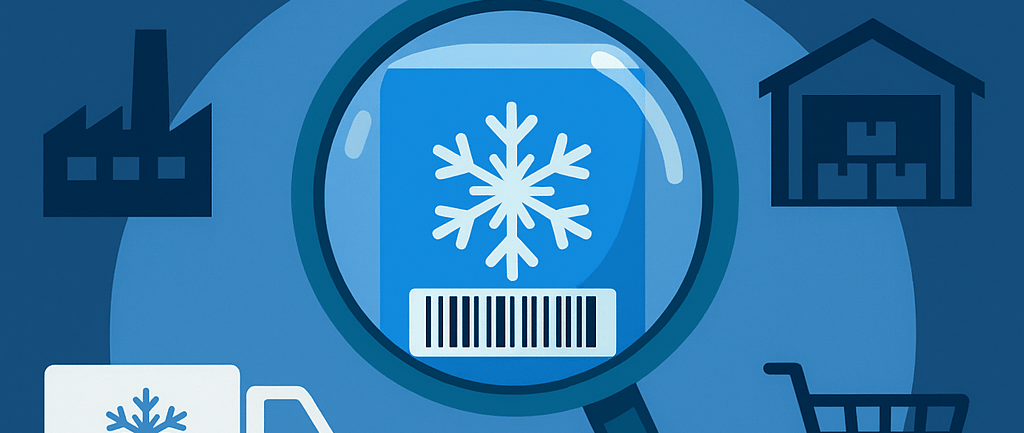The Invisible Thread
Why Traceability is Non-Negotiable in the Frozen Food Supply Chain
8/13/20253 min read


In the complex, globalized world of frozen food, products embark on an intricate journey from farm to fork. This journey, often spanning continents and multiple handling points, demands more than just efficient logistics; it requires an invisible thread of accountability. That thread is traceability, and in the frozen food supply chain, it's not just important – it's absolutely non-negotiable.
The stakes are incredibly high. A single contamination event, a mislabeled ingredient, or a temperature excursion can compromise an entire batch, leading to massive recalls, significant financial losses, and irreparable damage to consumer trust. In an industry where speed and scale are constantly increasing, the ability to pinpoint a product's exact origin and journey is the ultimate safeguard.
1. Rapid Response to Food Safety Incidents: The Recall Lifeline
When a food safety issue arises, time is of the essence. Every minute counts in preventing widespread illness and minimizing product loss.
Pinpoint Accuracy: Robust traceability systems allow for the rapid identification of affected batches, specific production dates, and even individual ingredient lots. This means instead of a broad, costly recall, you can conduct a surgical strike, removing only the compromised product from the market.
Reduced Scope of Recalls: By knowing precisely where a contaminated product came from and where it went, companies can limit the scope of a recall, saving millions in product, logistics, and reputation.
Protecting Public Health: The faster contaminated products are removed, the lower the risk to consumers, demonstrating a commitment to public health that builds long-term trust.
2. Building Unwavering Consumer Trust: Transparency as a Premium
Today's consumers are more informed and demanding than ever. They want to know the story behind their food, especially when it's frozen.
Farm-to-Freezer Transparency: Traceability allows brands to share the complete journey of their ingredients, from the farm where a vegetable was grown to the factory where it was frozen. This level of transparency fosters confidence.
Authenticity & Provenance: For specialty or premium frozen products, traceability validates claims of origin, ethical sourcing, or unique processing methods, adding significant value.
Crisis Resilience: When issues inevitably arise, a transparent and traceable supply chain demonstrates accountability and a rapid, effective response, rebuilding trust faster than opaque systems.
3. Optimizing Operations & Reducing Waste: Beyond Just Safety
While safety is paramount, traceability also offers significant operational advantages that contribute to profitability.
Inventory Management: Real-time visibility into inventory levels and product locations helps prevent overstocking, reduce spoilage, and optimize warehouse space, especially critical in energy-intensive frozen storage.
Waste Reduction: By identifying the source of quality issues quickly, factories can prevent larger batches from being compromised, leading to less product waste.
Process Improvement: Analyzing traceability data can reveal bottlenecks, inefficiencies, or recurring quality deviations in the production process, allowing for targeted improvements.
4. Regulatory Compliance: A Non-Negotiable Mandate
Regulatory bodies worldwide are increasingly mandating enhanced traceability, making it a legal requirement, not just a best practice.
Global Standards: Adherence to international standards (like FSMA's traceability rules in the US, or specific EU regulations for certain food categories) is crucial for market access and avoiding costly penalties.
Audit Readiness: A well-implemented traceability system makes regulatory audits smoother and more efficient, demonstrating proactive compliance.
Cross-Border Trade: For frozen foods moving across borders, robust traceability simplifies customs processes and ensures adherence to diverse national requirements.
5. Leveraging Technology for Superior Traceability
Modern traceability is powered by cutting-edge technology, moving far beyond paper logs.
Barcode & RFID Systems: Automated scanning at every touchpoint ensures accurate data capture.
Integrated ERP/MES Systems: Enterprise Resource Planning (ERP) and Manufacturing Execution Systems (MES) integrate data across the entire operation, providing a holistic view.
Blockchain Technology: For the ultimate in transparency and immutability, blockchain offers a decentralized, tamper-proof ledger of every transaction and movement in the supply chain. This is particularly powerful for complex global networks.
IoT Sensors: Real-time monitoring of critical parameters like temperature and humidity during transit and storage provides continuous data, enhancing cold chain integrity.
In the frozen food industry, traceability is no longer a luxury; it's a fundamental pillar of food safety, a driver of consumer trust, and a catalyst for operational excellence. Investing in robust, end-to-end traceability isn't just about meeting regulations; it's about building a resilient, transparent, and highly reputable business that can thrive in a demanding global market.
At @TastefulIdeasConsulting, we specialize in optimizing food factory operations and implementing advanced supply chain solutions, including comprehensive traceability systems. Ready to ensure your frozen food products are traceable, trusted, and ready for the future? Let's talk.
TASTEFUL IDEAS CONSULTING
Strategic Consulting for Food & Beverage Game Changers
info@tastefulidesconsulting.com
Services
Food and Beverage Consulting
Product Development
Brand Creation
Sales Growth